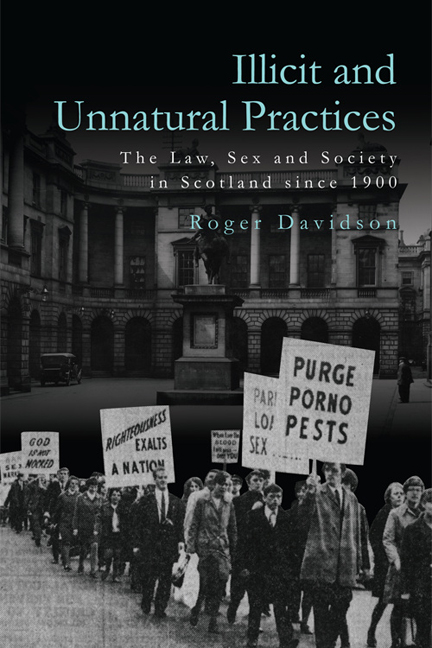Book contents
- Frontmatter
- Contents
- List of Figures and Tables
- Acknowledgements
- List of Abbreviations
- 1 Introduction
- 2 ‘Venereal Trouble’: The Case of ‘Professor’ Abraham Eastburn
- 3 ‘This Pernicious Delusion’: Law, Medicine and Child Sexual Abuse
- 4 ‘Unnatural Carnal Connection’: Bestiality and the Law in Early Twentieth-century Scotland
- 5 ‘There’s the Man who Shifts the Babies’: Abortion in the Scottish High Court, 1900−30
- 6 ‘An Open and Notorious House of Lewdness’: Dora Noyce and the Danube Street Brothel
- 7 Cure or Confinement? Law, Medicine and the Treatment of Homosexual Offenders in Scotland, 1950−80
- 8 ‘Liable or Likely to Deprave and Corrupt the Morals of the Lieges’: Sex Shops and Moral Panic in Late Twentiethcentury Scotland
- 9 ‘Culpable and Reckless Conduct’: Criminalising the Transmission of HIV in Scotland, 1983−2014
- 10 Conclusion
- Sources and Select Bibliography
- Index
8 - ‘Liable or Likely to Deprave and Corrupt the Morals of the Lieges’: Sex Shops and Moral Panic in Late Twentiethcentury Scotland
Published online by Cambridge University Press: 23 April 2021
- Frontmatter
- Contents
- List of Figures and Tables
- Acknowledgements
- List of Abbreviations
- 1 Introduction
- 2 ‘Venereal Trouble’: The Case of ‘Professor’ Abraham Eastburn
- 3 ‘This Pernicious Delusion’: Law, Medicine and Child Sexual Abuse
- 4 ‘Unnatural Carnal Connection’: Bestiality and the Law in Early Twentieth-century Scotland
- 5 ‘There’s the Man who Shifts the Babies’: Abortion in the Scottish High Court, 1900−30
- 6 ‘An Open and Notorious House of Lewdness’: Dora Noyce and the Danube Street Brothel
- 7 Cure or Confinement? Law, Medicine and the Treatment of Homosexual Offenders in Scotland, 1950−80
- 8 ‘Liable or Likely to Deprave and Corrupt the Morals of the Lieges’: Sex Shops and Moral Panic in Late Twentiethcentury Scotland
- 9 ‘Culpable and Reckless Conduct’: Criminalising the Transmission of HIV in Scotland, 1983−2014
- 10 Conclusion
- Sources and Select Bibliography
- Index
Summary
THE ANN BOLEYN SEX SUPERMARKET
Having made test purchases earlier in the day, at around 5.30 p.m. on 10 May 1971, armed with an arrest warrant, police officers from the Maryhill Division of Glasgow entered a shop called Anne Boleyn at St George's Cross in the district of Woodside, the first sex shop to be opened in Scotland. Chief Inspector Connor led the raid accompanied by four other officers. They took the names of the ten customers already on the premises, who included four girls aged between sixteen and eighteen, and removed, in six large polythene sacks, all the goods considered to be obscene, amounting to some £800 to £900 worth of sex toys and aids. The owner, John Cameron, and the manager, John Irvine, were charged with selling obscene items in contravention of section 162 of the Glasgow Corporation (General Powers) Order Confirmation Act 1960, and a report sent to the Procurator Fiscal. Though the shop was supposed to be open until 10 p.m., it was closed after the police had departed. However, the takings for the first day of business were in excess of £130 and, in the early afternoon, the shop had been so busy that, for a time, no more customers could be admitted.
The opening of Scotland's first sex shop produced a wave of moral outrage from local civic and church leaders, widely reported and supported in the media. A group of Glasgow councillors led by Mary Goldie, a former councillor for Woodside, organised a petition to the Secretary of State for Scotland of nearly 7,000 signatures, protesting at the likely impact of the sex shop on the locality: in particular, its potential to ‘demoralise and corrupt’ children and to act as a magnet for ‘undesirable elements’. The petition called upon the government either to legislate for the closure of such shops or to ensure that they were closely regulated under licence. Meanwhile, along with similar representations to the Scottish Office, the Glasgow Presbytery of the Church of Scotland and the Glasgow Standing Conference of Youth Organisations organised a prayer meeting and protest march of over 200 young people [see Figure 8.1] to press for the closure of the ‘sex supermarket’ and a ban on any future enterprises that threatened the moral health and integrity of the community.
- Type
- Chapter
- Information
- Illicit and Unnatural PracticesThe Law, Sex and Society in Scotland since 1900, pp. 153 - 176Publisher: Edinburgh University PressPrint publication year: 2018



